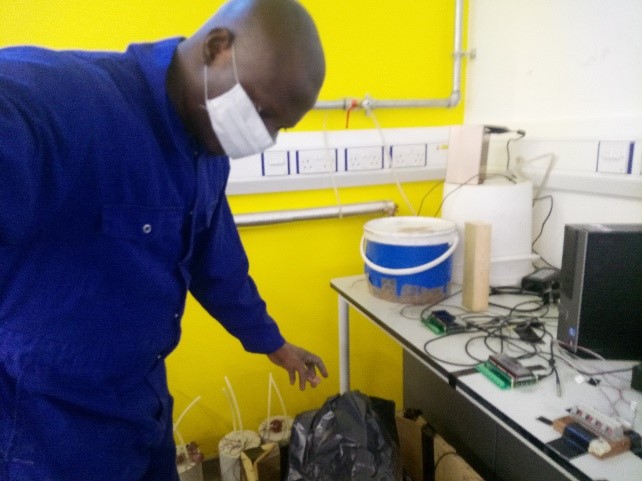FACULTY OF ENGINEERING

Engineering is in some ways a hybrid between Arts and Science. When seamlessly adopted and implemented with a vision and clearly defined goals and purposes, it should culminate in the improvement of infrastructures and the economy of a nation and the enhancement of the quality of life of the citizenry.
Hence, the Faculty of Engineering in Ajayi Crowther University should be slightly, if not wholly different, from the existing ones in the country. Consequently, the faculty has purpose-driven functions such as, but not limited to:
- Ensuring that individuals with flare and enthusiasm for Engineering are properly encouraged to have an interest in, and the capacity for the application of engineering principles for infrastructural development.
- Ensuring that the students of the faculty imbibe the culture of continual learning, a premise for maintaining sustainable competencies in solving new and emerging problems and challenges in engineering practice.
Understandably, apart from the critical emphasis placed on the applications of engineering methods and requisite training, students should acquire the habits and culture of industry and allied institutions in terms of orderliness, ethics, thoroughness, doggedness, constituency etc. In addition, the students in the course of their degree programmes are given the liberty to exercise/develop their inherent abilities for creativity, imagination, innovation, and sound judgement.
Each degree programme provides requisite elements of engineering education, as well as the discipline of professional training, and a sense of the art of engineering as distinct from its sciences in addition to the Students Industrial Works Experience (SIWES).
All programmes have a social and humanistic component that gives the student adequate knowledge of social and human relationships, duties of citizenry, and appreciation of cultures.
The Faculty has four departments: Computer Engineering, Electrical/Electronics Engineering, Mechanical Engineering, and Civil Engineering.
The Department of Electrical/Electronics will be awarding the degree of Bachelor of Engineering (B.Eng.) in Electrical/Electronics Engineering with the following options:
- Electrical Power Systems Engineering
- Electronics and Communication Engineering
- Instrumentation and Control Engineering
The Computer Engineering Department offers a Bachelor of Engineering (B.Eng.) degree in Computer Engineering. The Mechanical Engineering Department offers a Bachelor of Engineering (B.Eng.) degree in Mechanical Engineering. The Civil Engineering Department offers a Bachelor of Engineering (B.Eng.) degree in Civil Engineering.
ADMISSION REQUIREMENTS

UNIVERSITY MATRICULATION ENTRY MODE
Candidates seeking admission must have a minimum of five credits in not more than two sittings, in English Language, Mathematics, Chemistry, Physics, and any other two relevant subjects to the programme in the Senior Secondary School Certificate Examination (SSCE) or its approved equivalent by Federal Ministry of Education. Such a candidate must also have an acceptable pass in the University Tertiary Matriculation Examination (UTME).
DIRECT ENTRY
Candidates seeking admission into the Department by Direct Entry should possess, in addition to ordinary level requirement, one of the following:
- General Certificate of Education at Advanced Level in at least two relevant subjects.
- Ordinary National Diploma (OND) with a minimum of Lower Credit in relevant Sciences and Engineering discipline from recognized institutions for admission into 200 level.
- Higher National Diploma (HND) with a minimum of Lower Credit in relevant Science and Engineering discipline from a recognized Institution for admission into 300 level.
- Transfer Candidates: Students may be allowed to transfer into 200 or 300 level of the programme provided.
- They satisfy the University Conditions for transfer.
- Vacancies exist in the Department of interest.
DURATION OF PROGRAMMES IN THE FACULTY OF ENGINEERING
The Faculty of Engineering offers a 5-year degree programme for the Unified Tertiary Matriculation Examination (UTME) candidates while Direct Entry candidates with OND or HND Certificates are expected to complete the programme in 4 or 3 years respectively.
MINIMUM DEGREE REQUIREMENTS
- The minimum number of course units for the award of honours degree shall be 150.
- 150 course units, including all the compulsory courses, shall be used in the computation of the class of the degree.
- All the compulsory courses must be taken and passed.
- The minimum number of course units for the award of honours degree shall be 150 and for a Pass degree it shall be 125 units.
- The degree shall be awarded with honours provided an undergraduate obtains a G.P.A that is not less than 1.5 and satisfies other minimum honours degree requirements.
DEGREE CLASSIFICATION
The classification of the overall performance of each student shall be based on Cumulative Grade Point Average (CGPA) system.
| Class of Degree | CGPA |
First Class Honours | 4.50 – 5.00 |
Second Class Honours (Upper Division) | 3.50 – 4.49 |
Second Class Honours (Lower Division) | 2.40 – 3.49 |
Third Class Honours | 1.50 – 2.39 |
Meet our Department of Civil Engineering

Civil Engineering BEng (Hons) Programme
The BEng (Hons) degree in Civil Engineering is a five-year programme for UTME candidates and four-year programme for direct entry candidates. It is a programme with a focus on geotechnical, structural and environmental issues such as waste management, building on contaminated land and water treatment.
Why study this course
Our civil and environmental engineering programme offers you a highly regarded degree course at one of the top universities in this field, preparing you for exciting future career opportunities in designing and working with the built and natural environments. You will develop a thorough understanding of civil engineering theory, which will be backed up by practical application through laboratory and research work, field trips and design classes which prepares you for work as a professional civil engineer. There’s a strong emphasis on structural engineering, and throughout your course you’ll work on integrated design projects centred on industry-relevant case studies. Our close links with world-leading contractors and consultancy companies enable you to take up a salaried Professional Training placement. This gives you valuable experience which contributes towards chartership.
What’s it like to study here?
In the Department of Civil Engineering you’ll get an incredibly varied learning experience, and learn in an environment that’s been rated ‘Gold’ in the Teaching Excellence Framework. Your average week will combine lectures, seminars, personal tutorials, industry talks, lab sessions and group work, amounting to around 20 contact hours every week for a first year student. You’ll have a personal tutor who’ll support you throughout your time at ACU, and you’ll be able to schedule an appointment with them whenever you want or need to, using our online booking system.
Professionally accredited course
Accredited by the Nigerian Institute of Civil Engineers (NICE), the Nigerian Society of Engineers (NSE), and the Council for the Regulation of Engineering in Nigeria (COREN) for the purposes of fully meeting the academic requirement for registration as an Incorporated Engineer and partly meeting the academic requirement for registration as a Chartered Engineer.
Learning and assessment
You will be taught the fundamental aspects of engineering through a combination of lectures and tutorials, supplemented by practical lab sessions and project-based work. The taught modules in the first four years are largely compulsory, but options are available in year five. All students must complete a 3-unit individual project in yea five, for which they are allocated a supervisor from among the teaching staff.
There are opportunities for interaction with potential employers through careers fairs and guest lectures. Speakers from industry give regular lectures on their areas of expertise. These offer you the opportunity to hear experts speak on topics that are relevant to your degree and give you an insight into working in industry.
Feedback
We’ll provide you with frequent feedback on your work. This comes in a variety of formats including oral feedback in classes design and project work and via marked assignment. The opportunity to test your knowledge and understanding will be provided throughout the semester via class tests plus feedback on written assessments. Occasionally, peer assessment of an individual’s contribution to a group may be used, and you may also receive oral feedback on presentations and contributions to group activities.
Graduate careers
- Civil Engineer
- Design Engineer
- Project Manager
- Energy Engineer
- Project Planner
Fieldwork
There is an off-site residential field-course for five days in year three and four, as part of the Field Studies of Natural and Built Environment core.
Who will teach me?
Our teaching staff are all passionate about their field area of civil engineering, and keen to inspire students by sharing their knowledge. They include:
- Dr. Isaac O. Olawoore (Acting Head of Department & Chair in Geotechnics) – whose research focuses on developing heat and cold energy storage devices, a specialist in advanced geotechnical engineering and soil mechanics.
- Engr. Festus O. Adeyemi – whose research is in structures and construction materials.
- Engr. Oluwole A. Olaniyi – a specialist in structural engineering and innovative methods of structural analysis and design.
- Engr. Mary J. Adeyemi – an expert in the mechanics of biogas production, and environmental engineering.
- Get in touch
- Office of the Head of Department
- +2348132449690
- [email protected]
[wpdatatable id=17]
Fee Schedule
Faculty of Engineering’s Fee Schedule for the 2023/2024 Academic Session is given below:


